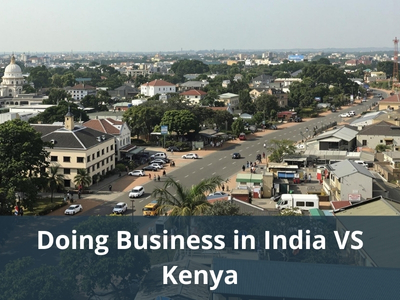Doing Business in India VS Kenya – A Comparison
 Entrepreneurs and investors often face a challenging decision when choosing between India and Kenya as their preferred business destination. Both countries offer unique advantages, making the choice a strategic one. India is renowned for its competitive landscape, high quality of life, and lower costs for setting up smaller businesses, while Kenya is celebrated for its growing economy and gateway position to East Africa. This article explores the key factors to help you make an informed decision.
Entrepreneurs and investors often face a challenging decision when choosing between India and Kenya as their preferred business destination. Both countries offer unique advantages, making the choice a strategic one. India is renowned for its competitive landscape, high quality of life, and lower costs for setting up smaller businesses, while Kenya is celebrated for its growing economy and gateway position to East Africa. This article explores the key factors to help you make an informed decision.
Key Comparison Points
Business Environment
- India: India boasts a stable political environment with a robust legal framework and government initiatives like Make in India to encourage investment.
- Kenya: Kenya offers a growing economy with improving political stability and government policies aimed at fostering foreign investment.
Taxation
- India: Corporate tax rates are 22% (15% for new manufacturing companies), with various tax incentives for startups and businesses in special economic zones.
- Kenya: Corporate tax rates are 30%, with tax incentives for businesses in export processing zones and agricultural investments.
Ease of Company Incorporation
- India: India has a streamlined incorporation process with strong digital infrastructure and government support for startups.
- Kenya: Kenya offers a relatively straightforward incorporation process, but digital infrastructure is still developing compared to India.
Cost of Living and Business Operations
- India: India provides lower operational costs, affordable office spaces, and comparatively low living expenses.
- Kenya: Kenya has moderate operational costs, but office space and living expenses can be higher in major cities like Nairobi.
Access to Markets
- India: India offers excellent global connectivity and access to international markets through trade agreements and its strategic location in Asia.
- Kenya: Kenya serves as a gateway to East Africa and benefits from regional trade agreements like the East African Community (EAC).
Quick Comparison Overview
Here’s a quick overview of the key differences for easy reference.
| Factor |
India |
Kenya |
| Business Environment |
Stable political environment, robust legal framework |
Improving political stability, growing economy |
| Corporate Tax Rate |
22% (15% for new manufacturing companies) |
30% |
| Capital Gains Tax |
Varies depending on asset type |
5% on the transfer of property |
| Ease of Incorporation |
Streamlined process, strong digital infrastructure |
Relatively straightforward, but digital infrastructure is developing |
| Business Costs |
Low operational costs, affordable living expenses |
Moderate operational costs, higher living expenses in cities |
| Market Access |
Global connectivity, trade agreements |
Gateway to East Africa, regional trade agreements |

Benefits of Choosing 3E Accounting
When navigating the complexities of doing business in India or Kenya, partnering with a reliable corporate service provider like 3E Accounting can make all the difference. With expertise in starting a business in India, a step-by-step guide to India company registration, and India company incorporation, 3E Accounting ensures a seamless setup process tailored to your needs. For company setup or any other assistance, feel free to contact us. Choose 3E Accounting for a hassle-free experience and focus on growing your business with confidence.
Ready to Expand into India? Choose 3E Accounting Today!
Stay Secure, Stay Successful With 3E Accounting Services
Contact Us Now
Frequently Asked Questions
It depends on your business goals. India offers a stable political environment, advanced digital infrastructure, and lower operational costs, making it attractive for tech startups and SMEs. On the other hand, Kenya acts as a strategic gateway to East Africa and has growing potential in agriculture and trade sectors.
India has a corporate tax rate of 22% (15% for new manufacturing companies), while Kenya’s corporate tax rate is 30%. India also offers tax incentives for startups and businesses in special economic zones.
India has a streamlined digital process with strong government support for startups. If you’re considering India company incorporation, the process is efficient and well-supported.
India offers competitive operational costs, global market access, and a thriving consumer base. If you’re considering starting a business in India, you’ll benefit from government incentives and a robust legal framework.
If you’re ready to get started or have questions, you can contact 3E Accounting to receive personalized guidance and solutions tailored to your business needs.
Abigail Yu oversees executive leadership at 3E Accounting Group, leading operations, IT solutions, public relations, and digital marketing to drive business success. She holds an honors degree in Communication and New Media from the National University of Singapore and is highly skilled in crisis management, financial communication, and corporate communications.


 Entrepreneurs and investors often face a challenging decision when choosing between India and Kenya as their preferred business destination. Both countries offer unique advantages, making the choice a strategic one. India is renowned for its competitive landscape, high quality of life, and lower costs for setting up smaller businesses, while Kenya is celebrated for its growing economy and gateway position to East Africa. This article explores the key factors to help you make an informed decision.
Entrepreneurs and investors often face a challenging decision when choosing between India and Kenya as their preferred business destination. Both countries offer unique advantages, making the choice a strategic one. India is renowned for its competitive landscape, high quality of life, and lower costs for setting up smaller businesses, while Kenya is celebrated for its growing economy and gateway position to East Africa. This article explores the key factors to help you make an informed decision.